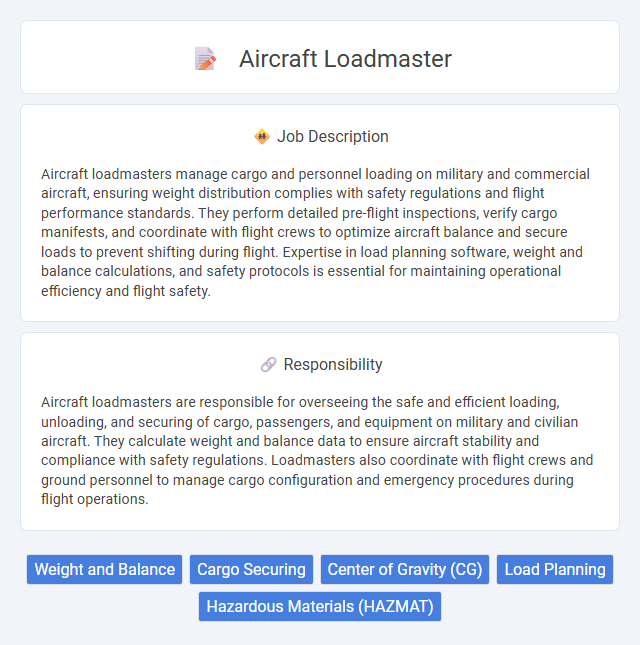
Aircraft loadmasters manage cargo and personnel loading on military and commercial aircraft, ensuring weight distribution complies with safety regulations and flight performance standards. They perform detailed pre-flight inspections, verify cargo manifests, and coordinate with flight crews to optimize aircraft balance and secure loads to prevent shifting during flight. Expertise in load planning software, weight and balance calculations, and safety protocols is essential for maintaining operational efficiency and flight safety.
People with strong physical stamina and excellent problem-solving skills are likely well-suited for the aircraft loadmaster job, given the demanding nature of loading, weight distribution, and safety checks involved. Those who can remain calm under pressure and work effectively within a team probably excel in this role due to the high-stakes environment and need for precise coordination. Individuals with limited attention to detail or poor physical fitness might find this job challenging and less compatible with their abilities.
Qualification
Aircraft loadmasters must hold a high school diploma or equivalent, with many employers preferring candidates who have completed military loadmaster training or aviation-related courses. Proficiency in weight and balance calculations, cargo securing techniques, and safety regulations is essential. Certification from the Federal Aviation Administration (FAA) or equivalent aviation authorities enhances job prospects and professional credibility.
Responsibility
Aircraft loadmasters are responsible for overseeing the safe and efficient loading, unloading, and securing of cargo, passengers, and equipment on military and civilian aircraft. They calculate weight and balance data to ensure aircraft stability and compliance with safety regulations. Loadmasters also coordinate with flight crews and ground personnel to manage cargo configuration and emergency procedures during flight operations.
Benefit
The role of an aircraft loadmaster likely provides numerous benefits, including enhanced job stability due to the critical nature of aircraft weight and balance management. It is probable that individuals in this position gain valuable logistical and safety experience transferrable to various aerospace or military careers. The likelihood of developing strong problem-solving skills and teamwork capabilities also appears high, supporting professional growth and career advancement.
Challenge
The role of an aircraft loadmaster likely involves complex challenges related to accurately calculating weight distribution and ensuring cargo balance for safe flight operations. Managing time-sensitive loading and unloading tasks under strict safety regulations may add to the pressure faced during missions. Adapting to rapidly changing cargo requirements and environmental conditions probably requires sharp problem-solving skills and attention to detail.
Career Advancement
Aircraft loadmasters manage cargo and passenger weight distribution to ensure flight safety and efficiency, gaining expertise critical for advancement. Career progression often leads to supervisory roles, training instructor positions, or transition into aircraft operations management. Mastery of load planning software and regulatory compliance enhances opportunities for leadership roles within aviation logistics and military or commercial sectors.
Key Terms
Weight and Balance
Aircraft loadmasters are responsible for managing weight and balance to ensure safe and efficient flight operations. They calculate cargo distribution, secure loads, and adjust ballast to maintain the aircraft's center of gravity within prescribed limits. Precise weight and balance management prevents structural stress and optimizes fuel consumption, enhancing overall flight performance.
Cargo Securing
Aircraft loadmasters play a critical role in cargo securing, ensuring all freight is properly restrained to maintain aircraft balance and safety during flight. They use specialized equipment such as straps, nets, locks, and chains to secure diverse cargo types, adhering strictly to weight distribution guidelines and FAA regulations. Accurate cargo securing prevents shifting loads that could compromise aircraft stability, contributing to efficient flight operations and passenger safety.
Center of Gravity (CG)
Aircraft loadmasters are pivotal in ensuring the aircraft's Center of Gravity (CG) remains within safe operational limits by calculating and distributing cargo, passengers, and fuel loads precisely. An improperly balanced CG can severely affect flight stability, fuel efficiency, and control responses, making the loadmaster's role essential for safety and mission success. Advanced load planning software and real-time weight data assist loadmasters in maintaining optimal CG positioning during diverse mission profiles.
Load Planning
Aircraft loadmasters specialize in load planning to ensure the safe and efficient distribution of cargo and passengers on military and commercial flights. They calculate weight and balance, optimize cargo placement, and secure equipment to maintain aircraft stability and comply with safety regulations. Expertise in load planning enhances operational effectiveness and prevents in-flight hazards by managing center of gravity and load limits.
Hazardous Materials (HAZMAT)
Aircraft loadmasters play a crucial role in the safe loading, securing, and transportation of hazardous materials (HAZMAT) on military and commercial aircraft. They ensure compliance with strict regulations from organizations such as the International Air Transport Association (IATA) and the Department of Transportation (DOT), properly classifying, labeling, and documenting substances to prevent accidents. Proficient in handling emergency procedures, loadmasters minimize risks associated with flammable, toxic, or corrosive materials, safeguarding both crew and cargo integrity during flight operations.
 kuljobs.com
kuljobs.com